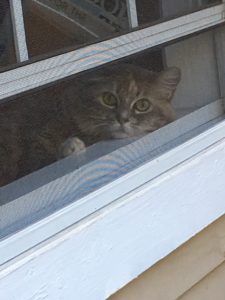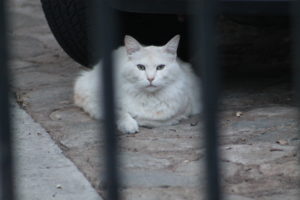 I believe in Hillary Clinton’s statement, “It takes a village to raise a child.” I used that quote the other day with regard to my aging mother. Yes, we’re finding that it takes a village—at least several caring family/friends and many resources to keep a ninety-seven-year-old healthy and safe. And it occurred to me that the same is true of our pets.
I believe in Hillary Clinton’s statement, “It takes a village to raise a child.” I used that quote the other day with regard to my aging mother. Yes, we’re finding that it takes a village—at least several caring family/friends and many resources to keep a ninety-seven-year-old healthy and safe. And it occurred to me that the same is true of our pets.
Hopefully you learn important tips and care techniques from the research I present here in the Catscapades blog. You do your own research on behalf of your precious cat, and you talk to friends about issues you’re having with her. And you discover the best solutions to whatever cat questions come up.
the Catscapades blog. You do your own research on behalf of your precious cat, and you talk to friends about issues you’re having with her. And you discover the best solutions to whatever cat questions come up.
In our neighborhood, and probably yours, everyone watches out for each other’s critters. I told a neighbor yesterday that I’d seen their cat, Moonie, paying a lot of attention to a certain area of her body—that maybe she has something going on there. Emily thanked me profusely for being observant. Well, Moonie is in my yard (which is free of little children) more often than in her own yard and I noticed this.
 Another neighbor told me about her cat’s suddenly swollen face. I’d seen enough abscesses and tooth problems on the veterinary shows I watch on weekends to know what this could mean. I said, “Take her to your vet now. The poor thing is in pain.” She promised to do so. (I heard later that it was an abscess and the veterinarian had to do some minor surgery.)
Another neighbor told me about her cat’s suddenly swollen face. I’d seen enough abscesses and tooth problems on the veterinary shows I watch on weekends to know what this could mean. I said, “Take her to your vet now. The poor thing is in pain.” She promised to do so. (I heard later that it was an abscess and the veterinarian had to do some minor surgery.)
In our neighborhood, we have keys to other neighbors’ homes and we take over the care of  each other’s pets when need be. I’ve taken care of bunnies, chickens, cats, dogs, fish, wild birds, and, yes, horses. We’ve had neighbors in to care for our fur babies. It’s nice to live in such a village. If you have just moved into a new area and you have pets, it will behoove you to get to know your neighbors. Assess their character, habits, and interest in others and animals, and you’ll no doubt discover someone that you feel comfortable handing over your extra house key and the care of your animals in time of disaster or should you take a trip, for example.
each other’s pets when need be. I’ve taken care of bunnies, chickens, cats, dogs, fish, wild birds, and, yes, horses. We’ve had neighbors in to care for our fur babies. It’s nice to live in such a village. If you have just moved into a new area and you have pets, it will behoove you to get to know your neighbors. Assess their character, habits, and interest in others and animals, and you’ll no doubt discover someone that you feel comfortable handing over your extra house key and the care of your animals in time of disaster or should you take a trip, for example.
Make it a habit to speak up when you see a free-range cat with a potential problem—excessive scratching could indicate fleas. A cat can die from flea infestation if he’s in a weakened condition. Maybe the cat is limping or getting thinner or behaving differently. People who let their cats roam, those who work away from home all day, and the elderly sometimes aren’t aware of a deteriorating condition in a cat or they don’t know that a neighbor kid is tormenting their cat or dog, for example. Be a good neighbor. Speak up. Give the cats a voice—be part of the village for good.





